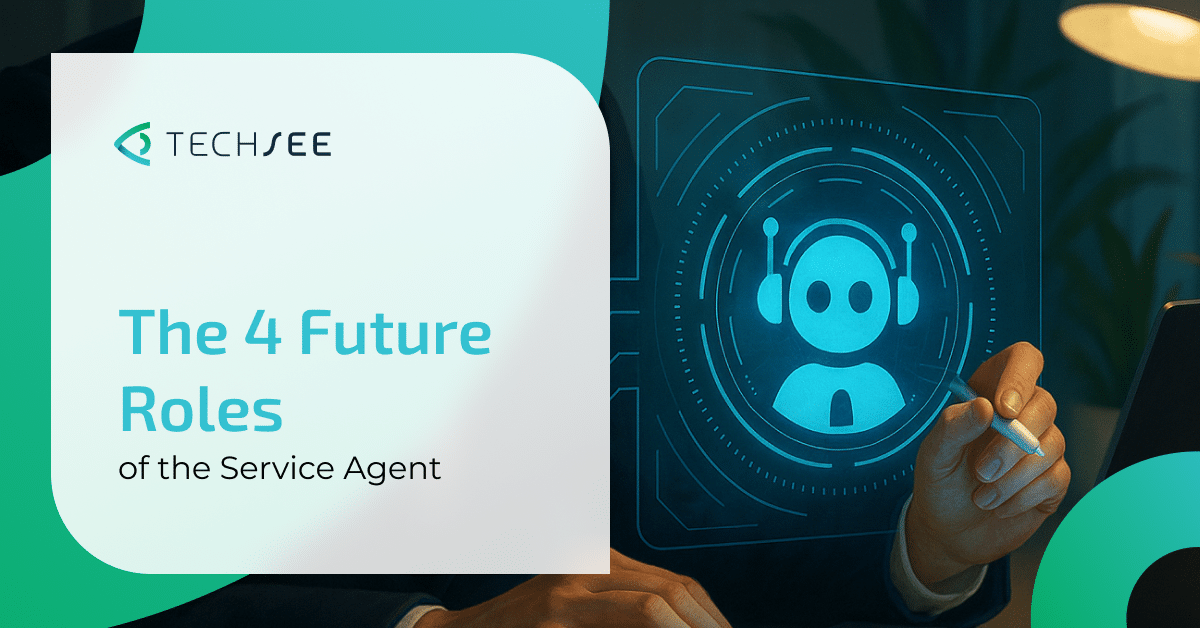Contents
- The 4 Future Roles of the Service Agent
- Efficiency Experts
- Personalization Specialists
- Exceptional Interventionalists
- Resolution Supervisors
- The Common Thread: Context
- Why Vision Matters in Every Role
- Conclusion
- FAQs
- What are the four future roles of the service agent?
- How will automation change contact center agent roles?
- What is an exceptional interventionalist service agent role?
- Why is vision critical in the future of customer support?
- Will human agents in customer interactions still matter as AI advances?
- What skills define the future of contact center agents?
The 4 Future Roles of the Service Agent
Customer service agents stand at a turning point. Automation, self-service, and AI have already absorbed much of the routine work once handled by contact centers. From what we hear in client discussions, leaders are asking a simple but urgent question: “If AI handles the simple stuff, what is left for our agents?”
The answer is evolution in roles. Agents are shifting into new roles defined by the complexity of the issues they now face and the value they create for customers and businesses. These roles are shifting because the workforce itself is under pressure. The average contact center faces 30–45% annual turnover, which means nearly half of a team may leave in a given year.
That level of churn creates hiring headaches. Plus, it erodes consistency, drains expertise, and accelerates the need for better-defined roles that can survive constant change. Amidst this, four roles are emerging as the blueprint for the future: efficiency experts, personalization specialists, exceptional interventionalists, and resolution supervisors. This article explores these 4 roles and the future of contact center agents in detail.
Efficiency Experts
In the past, efficiency was about speed: shorter phone calls, fewer minutes, lower costs. But as routine queries are automated, efficiency experts focus on something deeper, coordinating human effort alongside AI. These agents leverage AI systems that surface data, summarize histories, and handle manual entry. Eventually, it frees them to resolve issues faster and more accurately.
As per experts in the field, efficiency experts in customer service thrive in industries with high transaction volumes. These industries may include retail, banking, or insurance. Their performance is measured by productivity and how effectively they combine AI’s capabilities with human judgment to keep operations moving smoothly. They are the frontline against bottlenecks in environments where scale and accuracy must coexist.
Personalization Specialists
Efficiency is about doing things faster; personalization is about doing them better for each customer. Personalization experts are the people who turn customer data into meaningful experiences using history, preferences, and predictive analytics. Customers expect this level of relevance. According to research, 76% of customers expect personalization, and companies that deliver personalization are 71% more likely to see improved loyalty.
We hear from executives all the time that their teams have mountains of customer data but no way to act on it. Personalization experts bridge that gap, turning service from a transactional interaction into a relationship-building moment.
For example, a personalization expert might recognize a customer’s usage pattern and proactively recommend an upgrade that’s better suited to their needs. This role turns the contact center into a revenue generator, not a cost center.
Exceptional Interventionalists
As AI takes over more decision-making, there will still be times when a human needs to step in. Interventionalists are those people: highly skilled professionals who manage exceptions, resolve unusual problems, and act in risky situations. They matter most when the brand is on the line.
A hospital’s network can be set up incorrectly. This can lead to issues. A financial disagreement may result in losing a customer. Additionally, a security breach in smart devices can also create problems. In those moments, humans need to intervene.
We see in our client calls that organisations underestimate how valuable these roles are until a crisis exposes the limits of automation. They have technical skill, empathy, and authority to get things back on track.
Resolution Supervisors
The highest level is the resolution supervisor. In this model, AI systems do almost all the work and agents oversee, monitor, and correct as needed. Resolution supervisors focus on governance, compliance, and trust.
Although this role is still emerging, it’s where we see industries heading where automation is mature. Our telecom leaders report that supervisors are starting to spend more time auditing AI outcomes than talking to customers. Their role is less about intervening and more about making sure autonomous systems work as intended, errors are captured, and customers are protected.
The Common Thread: Context
Across all four roles, one thing is true: none can work without context. Efficiency experts need context to resolve fast, and personalization specialists need it to recommend. Interventionalists need it in the moment of crisis, and supervisors need to see the whole picture to build trust. Without the right context, agents can’t perform at the level these roles require.
Why Vision Matters in Every Role
This is where visual AI comes in. Context is about seeing the environment where the customer’s problem exists. Efficiency experts use visual AI to see the issue instantly instead of relying on verbal descriptions. So they resolve faster, improve FCR and reduce truck rolls.
Personalization specialists can show customers products or environments directly through visual guidance. They can personalize their interaction based on what they see the customer is facing in their unique environment.
Exceptional interventionalists gain credibility by validating problems with visual evidence and step-by-step support. Resolution supervisors need visual proof to know automated customer processes are delivering the right outcomes.
The market difference is huge. Truck rolls are avoided, call times are shorter, customers feel heard and agents are confident. Vision-first AI is the missing layer that connects these roles to real-world results.
Conclusion
The future of customer service agents is about reinvention. Efficiency experts, personalization specialists, exceptional interventionalists, and resolution supervisors illustrate the paths agents are already beginning to walk.
The winners will be those who embrace human + AI collaboration. Agents will not be the last resort after automation fails. However, they will be the key to turning complex, high-value customer interactions into moments of loyalty and trust. And when empowered with vision, these roles stop being theoretical archetypes and become everyday reality.
FAQs
What are the four future roles of the service agent?
The four roles are efficiency experts, personalization specialists, exceptional interventionalists, and resolution supervisors. Each role reflects how agents will adapt as AI automates routine tasks. Rather than being replaced, agents will evolve into specialists who handle complexity, build loyalty, and ensure trust.
How will automation change contact center agent roles?
Automation will shift agents away from repetitive, low-value tasks and into more complex, value-driven roles. Efficiency experts will focus on productivity with AI as a partner, while personalization specialists will tailor experiences. Over time, interventionalists and supervisors will emerge as humans oversee or intervene in advanced AI-led environments.
What is an exceptional interventionalist service agent role?
An exceptional interventionalist is an agent who steps in when AI cannot handle a situation, especially during emotionally charged interactions. These agents combine technical knowledge with empathy and authority to manage exceptions, prevent escalation, and protect the brand in moments of truth.
Why is vision critical in the future of customer support?
Vision provides context that text and voice alone cannot. With visual AI, agents can see the environment, validate issues, and guide customers step by step. This reduces truck rolls, resolves problems faster, and builds customer trust. Across all four roles, vision is the layer that makes complex interactions solvable.
Will human agents in customer interactions still matter as AI advances?
Yes. Human agents will continue to play a vital role in customer service, even as AI becomes more advanced. Their responsibilities will evolve toward judgment, empathy, and trust-building. AI will automate routine work, but humans will remain essential for complexity, brand reputation, and moments that demand accountability.
What skills define the future of contact center agents?
The future of contact center agents will depend on strong skills such as empathy, clear communication, and problem-solving. To succeed, contact center agents of the future will also need adaptability, data literacy, and the ability to work with AI tools and personalized support.






